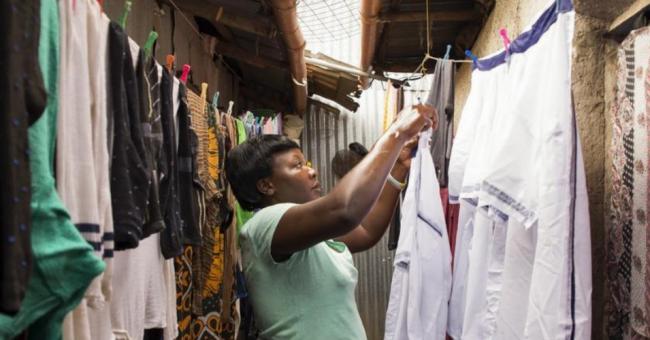Articles Menu

Jan 20, 2020
"Economic inequality is out of control."
That's the opening line of Time to Care: Unpaid and Underpaid Care Work and the Global Inequality Crisis (pdf), a report that Oxfam International published Monday, ahead of the annual World Economic Forum (WEF) summit in Davos, Switzerland.
"The gap between rich and poor can't be resolved without deliberate inequality-busting policies, and too few governments are committed to these."
—Amitabh Behar,
Oxfam India
"In 2019, the world's billionaires, only 2,153 people, had more wealth than 4.6 billion people," the report says. "This great divide is based on a flawed and sexist economic system."
The report details how the world's existing economic system serves the richest among us while undervaluing work such as caregiving—which is disproportionately performed by females—and emphasizes the need for global governments to pursue bold actions to address inequality.
"The gap between rich and poor can't be resolved without deliberate inequality-busting policies, and too few governments are committed to these," Oxfam India CEO Amitabh Behar, who is in Davos this week, said in a statement.
"Our broken economies are lining the pockets of billionaires and big business at the expense of ordinary men and women," Behar added. "No wonder people are starting to question whether billionaires should even exist."
Among the new report's key findings are:
The report explains that "this broken economic model has accumulated vast wealth and power into the hands of a rich few, in part by exploiting the labor of women and girls, and systematically violating their rights."
"Unpaid care work is the 'hidden engine' that keeps the wheels of our economies, businesses, and societies moving."
—Behar
As Behar put it: "Women and girls are among those who benefit least from today's economic system. They spend billions of hours cooking, cleaning, and caring for children and the elderly."
"Unpaid care work is the 'hidden engine' that keeps the wheels of our economies, businesses, and societies moving," he said. "It is driven by women who often have little time to get an education, earn a decent living, or have a say in how our societies are run, and who are therefore trapped at the bottom of the economy."
Oxfam estimates that those at the bottom of the economy—particularly females living in poverty and from marginalized groups—collectively spend 12.5 billion hours daily on free care work, "and countless more" earning low wages. Their work "adds value to the economy of at least $10.8 trillion," which the report calls "an underestimate."
According to Oxfam:
Without decisive action things will get far worse. Aging populations, cuts in public spending, and climate change threaten to further exacerbate gender and economic inequality and to fuel a spiraling crisis for care and carers. While the rich and powerful elite may be able to buy their way out of facing the worst of these crises, the poor and powerless will not.
Governments must take bold and decisive action to build a new, human economy, that will deliver for everyone rather than a rich few, and that values care and well-being above profit and wealth.
Some "possible and crucial first steps" highlighted in the report include investing in national care systems with input from women's rights advocates, providing free public services that aim to close wealth gaps, and implementing "policies to limit the influence of corporations and the super-rich," including progressive taxation.
"Governments created the inequality crisis—they must act now to end it," asserted Behar. "They must ensure corporations and wealthy individuals pay their fair share of tax and increase investment in public services and infrastructure."
"They must pass laws to tackle the huge amount of care work done by women and girls, and ensure that people who do some of the most important jobs in our society—caring for our parents, our children, and the most vulnerable—are paid a living wage," he said. "Governments must prioritize care as being as important as all other sectors in order to build more human economies that work for everyone, not just a fortunate few."
Other organizations responded to Oxfam's findings with condemnation of the current system as well as calls to action.
Sharing the new report on Twitter Monday, Greenpeace declared: "We don't need extreme wealth. We need a sustainable economy that works for everyone."
[See video at link]
How many billionaires does it take to tackle the #climate crisis?
HINT: We don't need extreme wealth. We need a sustainable economy that works for everyone #WEF20 #FightInequality https://twitter.com/Oxfam/status/1219047385956904960 …
In a statement from the Independent Commission for the Reform of International Corporate Taxation that acknowledged Oxfam's latest figures on global wealth inequality, commissioner Magdalena Sepúlveda warned that "if multinationals—and the super-rich—do not pay their fair share of taxes, governments cannot invest in access to education, healthcare, and decent pensions, or take measures to mitigate and adapt to the climate crisis."
"The impact is even greater for developing countries, as they rely more on corporate taxes. Furthermore, the tax burden is shifted to the poorest, usually through taxes regressive to consumption, such as value-added tax (VAT)," said Sepúlveda, also executive director of the Global Initiative for Economic, Social, and Cultural Rights.
"It is incumbent on all of us to make a clear commitment to the issue of international taxation, no longer considering it as a technical issue to be discussed behind closed doors," she concluded. "We must work collectively to put the interests of the majority of citizens above the often-unreasonable profits of a small group of shareholders."
[Top photo: "Our broken economies are lining the pockets of billionaires and big business at the expense of ordinary men and women. No wonder people are starting to question whether billionaires should even exist."]